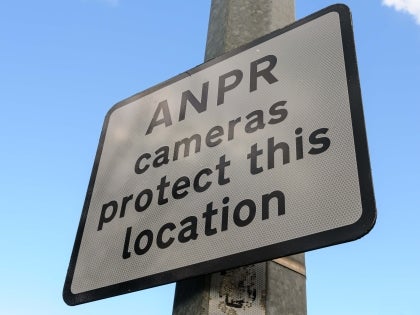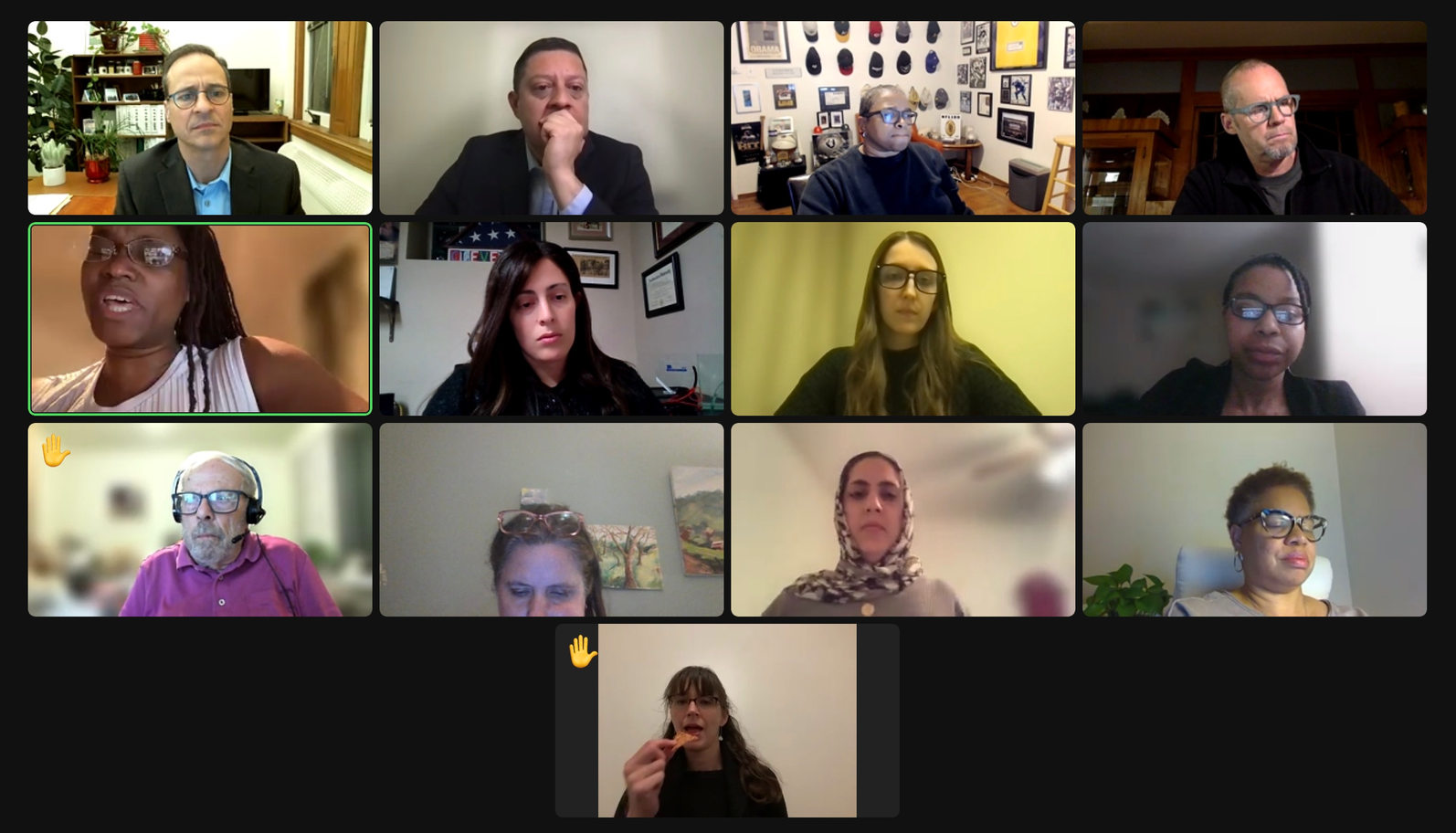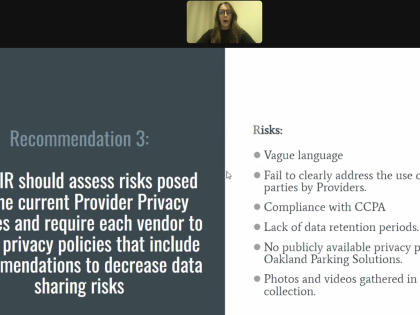T.E.C.H. Hub, IoT Collab Find Equity Via Student Research

$90K research project funded by Public-Interest Technology University Network (PIT-UN) examines consumer data privacy laws and equity impact assessments for surveillance technology
This month, an interdisciplinary team of Cleveland State University graduate students including Master of Social Work student Sarah Behlke and law students Jessica Cohen, Zachary Jacobson, Sharilyn Clark, and Katrice Williams presented to the City of Oakland California Privacy Advisory Commission (COCPAC), an analysis of the data privacy and equity risks posed by the City’s proposal to expand an app-based mobile parking payment system run by several private vendors.
On December 1, the students presented their analysis and recommendations to representatives from the COCPAC and the Oakland Department of Transportation. Their accompanying memorandum provided eight recommendations to mitigate risks—including incorporating restrictions based on California’s consumer privacy law on how the vendors can use consumer data they collect, and in establishing a more equitable system for citation payments.

Following their presentation Commission Chair Brian Hofer, who also participated in the clinic, said that the students’ analysis “raised important issues that weren't included in the draft proposal from the City” and “saved the Commission several months of work.,” according to Cohen.
“This clinic allowed us to expand our understanding of data privacy and how it impacts equity while applying what we have learned in the classroom to a real-world challenge,” Cohen added. “It was a privilege to engage in this work and we are grateful to the City of Oakland and Cleveland State University for this incredible opportunity.”
The students are participating in the Data Privacy & Equity Assessment Clinic co-taught by Dr. Patricia Stoddard-Dare and Professor Brian Ray with Dr. Chansu Yu (Engineering) and several national experts Kelsey Finch (Aleada Consulting), Miles Light (Future of Privacy Forum), Brian Hofer (Secure Justice), Lydia de la Torre (Golden Data Law), Ann LaFrance (Squire Sanders ret.), and Candace Moore (Golden Data Law).

“It was impressive to see this interdisciplinary group of students work together on a complicated project that will have real benefits for the City of Oakland residents,” said Ray, Director of the Center for Cybersecurity and Privacy Protection and CSU College of Law Professor.
“It is inspiring to see students meaningfully contribute to improving community privacy and equity,” said Dr. Stoddard Dare, Director of Women’s and Gender Studies, Professor of Social Work and Co-Director of the CSU T.E.C.H. Hub.
The clinic was supported by the CSU T.E.C.H. Hub, along with the IoT Collaborative, and a $90,000 research project funded by the Public-Interest Technology University Network (PIT-UN) to design and pilot a training program and student clinic to conduct data privacy and equity impact assessments for surveillance technologies.
For the class, the students reviewed and analyzed an application by the Oakland California Department of Transportation to deploy a new technology. This community engagement project allowed students to think deeply about issues of equity and privacy when new technologies are being considered for deployment by city government.

“As a fourth-year law student at the CSU College of Law, it was exciting to participate in an interdisciplinary online course around data security and privacy” said Williams. “I was able to employ my previous graduate degree in social work with my current educational pursuit in law to understand how cities’ adoption of connected technologies can pose risks to privacy and equity for residents.
“We specifically focused on the implementation of a mobile parking payment system and the deployment of automated license plate readers to verify parking sessions, which on its face is relatively innocuous,” she added.
“However, when vehicle-mounted ALPR/ANPR (Automated License Plate Readers/ Automated Number Plate Recognition) cameras are deployed in cities—specifically low-income communities—it significantly increases the likelihood that low-income residents will be disproportionately targeted for ticketing and other driving penalties, including license suspension and car towing for unpaid tickets, and it can chill free speech when images of people and homes are taken.”

The adverse consequences on individuals’ driving privileges for high-cost parking tickets are "not easily remedied with income-based repayment plans," according to Williams, because the “eligibility criteria are restrictive and the penalties for one missed payment are high.”
Together, the team worked together to provide recommendations to the Oakland Privacy Advisory Commission about a few of these considerations and how to improve citizens' right to privacy with the deployment of these technologies and mitigate its negative financial consequences.
“I would highly recommend that other law schools consider partnering with cities adopting surveillance and connected technologies, so our elected leaders understand the potential misuse of technology,” Williams said.
“This work reflects the heart of CSU’s mission to empower students to impact the community in a positive way,” Dr. Stoddard Dare said. “We are grateful to the Public Interest Technology University Network, Internet of Things Collaborative, and the CSU T.E.C.H. Hub for helping this class come to fruition.”